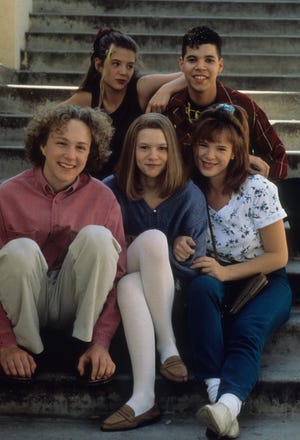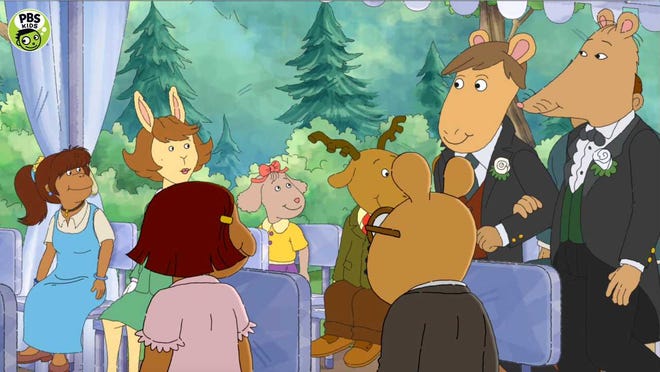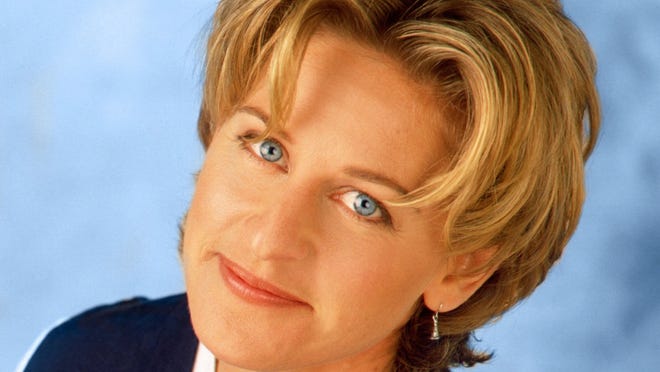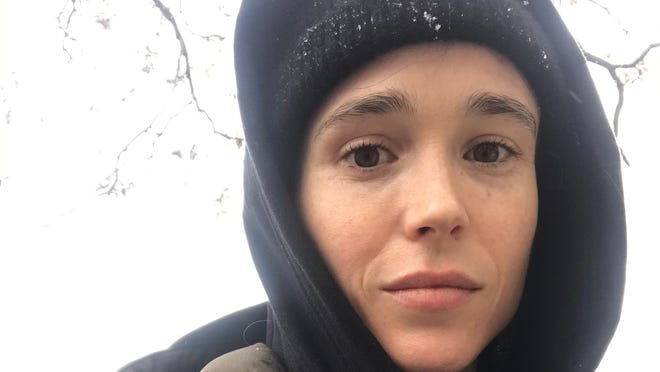Less than 25 years ago, the very idea of a TV star and her sitcom character identifying as lesbian was earth-shaking, as Ellen DeGeneres‘ coming-out announcement became a major national story.
“The Puppy” episode of ABC’s “Ellen,” which aired in April 1997, was one of the biggest milestones in the recognition of LGBTQ actors, characters and storylines on television.
In the years before and since, TV has had a mixed record in portraying (and including) LGBTQ characters and actors.
Pride Month provides an important opportunity to focus on TV portrayals that helped viewers gain greater understanding or reflected the evolving attitudes of the public.
Pride Celebration:We need to celebrate LGBTQ joy this Pride Month. Lives depend on it.

TV’s increasing inclusivity is evidenced by series such as Fox’s “9-1-1: Lone Star,” Hulu’s “Love, Victor” and Showtime’s “Billions,” and reflects the growing influence of prolific producers including Greg Berlanti, Ryan Murphy and Shonda Rhimes. A look at the major milestones:
Meaning of Pride:The first Pride was a protest. For LGBTQ activists, action is still the priority.

‘All in the Family’ (1971-79)
Living up to its trailblazing reputation, Norman Lear‘s legendary comedy becomes the first sitcom with a gay storyline in 1971, as bigoted Archie has trouble believing an old buddy is gay. While many shows remained hesitant, other Lear shows introduced LGBTQ characters, including a gay couple on “Hot L Baltimore” (1975); a trans woman on “The Jeffersons” (1977); and a trans main character on the short-lived “All That Glitters” (1977).
‘That Certain Summer’ (1972)
Three years after the Stonewall Uprising in New York marked a turning point in the battle for LGBTQ rights, this ABC movie of the week offered what many consider the first compassionate portrayal of a same-sex couple (played by Hal Holbrook and Martin Sheen).

‘An American Family’ (1973)
This landmark documentary following the Loud family is primarily known as the precursor of reality TV – with the cachet of PBS – but it also stood out because one of the family’s sons, Lance, was openly gay at a time when society was less hospitable.

‘Soap’ (1977-81)
Jodie Dallas (Billy Crystal) was network TV’s first memorable gay series regular. In ABC’s over-the-top parody of daytime soap operas, Jodie goes from dating a football player to fathering a daughter with a woman who seduces him. (That also made him the first openly gay father in primetime.)
‘St. Elsewhere’ (1982-88)
NBC’s acclaimed medical drama was the first primetime drama to document AIDS with the story of a closeted politician. In 1985, NBC aired “An Early Frost,” the first TV movie dealing with AIDS, which followed a young gay man (Aidan Quinn) dealing with HIV and coming out to his parents.
‘One Life to Live’ (1968-2013)
As an openly gay teen, Billy Douglas (Ryan Phillippe) was a groundbreaking character in daytime television when he was introduced in 1992. The ABC soap featured other LGBTQ storylines during its five-decade run, receiving multiple GLAAD media awards. In 2009, “All My Children,”which featured daytime’s first lesbian character in 1983, presented another genre first: the same-sex wedding of Reese Williams and Bianca Montgomery.

‘My So-Called Life’ (1994-95)
This much-praised but short-lived ABC high school drama featured Wilson Cruz as Rickie Vasquez, the first openly gay actor to play a gay main character on a primetime series. Fifteen-year-old Rickie provided a sign of hope to LGBTQ youths who felt like they were all alone.
‘The Real World: San Francisco’ (1994)
Pedro Zamora, a young gay man who was HIV-positive, offered an empathetic human face to challenge hostile caricatures in the third season of the iconic MTV reality soap. He died of AIDS-related complications just hours after the season finale aired, but the attention he drew to AIDS and LGBTQ issues remains a lasting memorial that earned him praise from then-President Bill Clinton.

‘Ellen’ (1994-98)
Neither DeGeneres nor her sitcom character, Ellen Morgan, identified publicly as lesbian until 1997, late in the ABC comedy’s fourth season. After months of speculation, and at a time when such revelations could severely damage careers, both the star and her character revealed their true identities, Morgan in a funny airport scene and DeGeneres via Oprah Winfrey‘s talk show and Time magazine.
Watershed moment:20-year flashback: Ellen DeGeneres came out, and paved the way for more gay TV role
‘Will & Grace’ (1998-2006; 2017-20)
Unlike on “Ellen,” two gay characters were at the center from the beginning of this NBC comedy. When then-Vice President Joe Biden endorsed marriage equality in 2012, he cited the sitcom’s influence: “I think ‘Will & Grace’ probably did more to educate the American public than almost anything anybody’s ever done so far.” The U.S. Supreme Court legalized same-sex marriage three years later.
‘Queer as Folk’ (2000-05)
In 2000, Showtime’s drama featuring an ensemble of gay men living in Pittsburgh was a sign of premium cable’s ability to focus on niche audiences, providing programming broadcast networks shied away from. In 2004, Showtime unveiled “The L Word,” a series that featured characters who identified as lesbian, bisexual and transgender. A sequel, “The L Word: Generation Q,” premiered in 2019.
‘Angels in America’ (2003)
HBO’s celebrated adaptation of Tony Kushner’s Pulitzer-winning play that contemplated the AIDS epidemic and contemporary politics, featuring such screen legends as Meryl Streep and Al Pacino, is one of many LGBTQ-oriented productions from the premium cable network.
‘Queer Eye’ (2003-07; 2018-)
Five gay men who were experts in such fields as fashion, grooming and interior design became media stars in this hit personal makeover show. Originally called “Queer Eye for the Straight Guy,” the Bravo series shortened its title in its third season to provide makeovers to a broader cross section of people. Netflix successfully rebooted the series in 2018.
‘Modern Family’ (2009-20)
ABC’s huge, broad-based sitcom hit introduced viewers to Mitchell and Cameron, a loving couple who adopt and raise a baby daughter, facing all the joys and challenges of parenthood. Mitch (Jesse Tyler Ferguson) and Cam (Eric Stonestreet), who married in the fifth season in 2014, offered a portrayal of LGBTQ characters that hasn’t always been common on TV.

‘RuPaul’s Drag Race’ (2009- )
In 2009, multitalented RuPaul launched a search for a drag superstar that celebrated LGBTQ identity. The iconic, long-running hit captivated viewers and has earned multiple Emmys. It began its run on Logo TV, a cable network with programming designed to appeal to LGBTQ viewers, before moving to VH1.

‘Orange Is the New Black’ (2013-19)
Laverne Cox became the first openly transgender person to earn a Primetime Emmy nomination for her portrayal of inmate Sophia Burset in Netflix’s dramedy that centered on the diverse population of a minimum-security women’s prison.
‘Transparent’ (2014-19)
Amazon’s comedy-drama about an older trans woman and her family drew acclaim and awards, including a Golden Globe and a Peabody, and featured a crew that included dozens of trans workers. Some questioned the casting of cisgender male Jeffrey Tambor as Maura Pfefferman and, later, allegations of sexual harassment against him led to Tambor’s early departure.

‘Supergirl’ (2015-21)/’Black Lightning’ (2017-19)
Two of CW’s DC Comics series, both produced by Berlanti, broke new ground. In 2018, “Supergirl” introduced TV’s first transgender superhero Nia Nal/Dreamer (played by Nicole Maines, a trans woman) and “Lightning” launched network TV’s first lesbian superhero, Anissa Pierce/Thunder and later Blackbird (Nafessa Williams).

‘Arthur’ (1996- )
Mr. Ratburn, the beloved elementary school teacher on PBS’ animated children’s show, finally took the plunge in 2019, marrying chocolate shop owner Patrick. Arthur and other students, who attend the wedding, approved.

‘Pose’ (2018-2021)
Producer Murphy took viewers to New York’s drag ball scene in the 1980s and 1990s with this drama focused largely on the Black and Latino LGBTQ and gender-nonconforming competitors and a cast that featured five transgender actors. Billy Porter, who stood out as emcee and fashion designer Pray Tell, became the first openly gay Black man to win an Emmy as lead actor.
For more significant moments, visit the online Pride Month exhibit at The Paley Center for Media.


